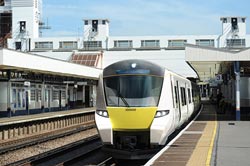Thameslink contract signed: Siemens to deliver trains worth circa 1.8 billion euros

<br>
Siemens has secured an order for the supply of 1,140 new commuter rail carriages in Great Britain for a total of around 1.6 billion pounds (approximately 1.8 billion euros). In addition, Siemens will be responsible for the long-term maintenance of the fleet and overseeing construction of two new train maintenance depots.
This is the largest order that Siemens has ever won in Great Britain and one of the biggest orders for Siemens’ global rolling stock business. Siemens partnered with Cross London trains (XLT) for this important contract. XLT is a consortium comprising Siemens Project Ventures GmbH, Innisfree Limited and 3i Infrastructure plc and will be responsible for financing the deal.
“This order is an impressive reminder of our leading position in the British rail market, where we enjoy an excellent reputation. Our commuter trains are seen as the most reliable in the country. Annually, more than 350 trains travel over 80 million kilometers in Great Britain,” says Jochen Eickholt, CEO of Siemens Rail Systems.
The Thameslink north-south commuter route runs through London, connecting Bedford, located to the north east of the capital, with Brighton, on the south coast. Introducing a high capacity, high frequency service of longer trains, extended platforms and new stations, the project is regarded as one of the largest rail infrastructure projects in the UK. Siemens was named preferred bidder in June 2011.
For the Thameslink project Siemens invested almost 50 million euros in the development of a new train platform. The new Desiro City for suburban, regional and main-line transport reduces overall energy consumption and track wear by up to 50% compared to predecessor models. Thanks to an improved interior layout, the new generation of trains also offers greater comfort and increased flexibility. The number of seats and the distances between them can also be varied according to passenger demand or the area of deployment, providing additional standing room or space for bicycles and wheelchairs where needed. The trains will be manufactured at the Siemens factory in Krefeld, Germany, and the first trains will enter service in 2016.
Backed by years of experience gained from the delivery of around 1,500 cars of its service-proven Desiro platform for Great Britain, Siemens developed the Desiro City – a new platform designed specifically for the British market. These trains are up to 25 percent lighter than the existing Desiro UK fleet, thanks mainly to car bodies of lightweight aluminum construction and to bogies that are approximately one-third lighter in weight. It has a recycling quota of about 95 percent. The Desiro City is based on the Single Car Concept, which integrates the entire traction equipment into one motor car. All of these motor cars are identically equipped and can be used both as end cars and as intermediate cars. This ensures a high degree of flexibility when it comes to adjusting the train configuration to cope with expected passenger volumes.
The Desiro City Thameslink can be coupled to form 8 and 12-car trains and operated in dual mode (750 V DC or 25 kV AC). They are built for a top speed of 160 km/h or around 100 mph. Siemens on-board units (OBU) that meet the requirements for the European Train Control System (ETCS) Level 2 safeguard the communication between the trains and trackside equipment. A heating, ventilation and air-conditioning (HVAC) system equipped with CO2 sensors automatically controls the flow of fresh air according to the number of passengers in each car.
Siemens will also oversee the maintenance of the fleet and build two new rolling stock depots in Three Bridges and Hornsey. Siemens is the market leader for service and maintenance in the UK, ensuring that over 350 trains enter passenger service each day. Including this latest contract, Siemens has now supplied close to 3,000 rail vehicles to Great Britain.
Contact for journalists:
Siemens AG, Media Relations
Peter Gottal, phone: +49 30 386-20280
E-mail: peter.gottal@siemens.com
The Siemens Infrastructure & Cities Sector (Munich, Germany), with approximately 90,000 employees, focuses on sustainable technologies for metropolitan areas and their infrastructures. Its offering includes products, systems and solutions for intelligent traffic management, rail-bound transportation, smart grids, energy efficient buildings, and safety and security. The Sector comprises the divisions Building Technologies, Low and Medium Voltage, Mobility and Logistics, Rail Systems and Smart Grid. For more information, visit www.siemens.com/infrastructure-cities
The Siemens Rail Systems Division (Berlin, Germany) is an international leader in providing rolling stock and related services. Its portfolio covers the full range of vehicles – from railroad cars to metros and locomotives to trams and light-rail vehicles. The Division combines competence in the areas of local, long-distance, and logistical transport to offer comprehensive expertise for environmentally friendly, efficient, and reliable rail vehicles, which are already in use in more than 40 countries. For more information, visit http://www.siemens.com/rail-systems
Media Contact
More Information:
http://www.siemens.com/press/ThameslinkAll latest news from the category: Corporate News
Newest articles

New model of neuronal circuit provides insight on eye movement
Working with week-old zebrafish larva, researchers at Weill Cornell Medicine and colleagues decoded how the connections formed by a network of neurons in the brainstem guide the fishes’ gaze. The…

Innovative protocol maps NMDA receptors in Alzheimer’s-Affected brains
Researchers from the Institute for Neurosciences (IN), a joint center of the Miguel Hernández University of Elche (UMH) and the Spanish National Research Council (CSIC), who are also part of…

New insights into sleep
…uncover key mechanisms related to cognitive function. Discovery suggests broad implications for giving brain a boost. While it’s well known that sleep enhances cognitive performance, the underlying neural mechanisms, particularly…



